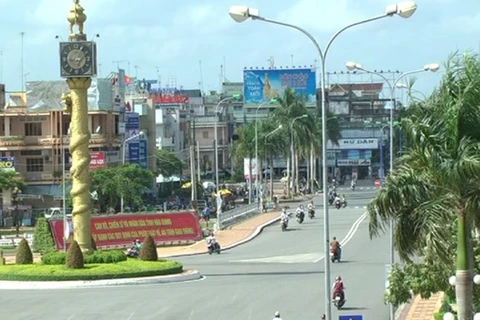Hau Giang (VNS/VNA) - The Mekong Delta province of Hau Giang has achieved sustainable poverty reduction through proactive measures like providing soft loans and training in vocational skills for the poor.
Nguyen Hoang Anh in Vi Thuy district’s Vinh Trung commune, who used to be poor, said local authorities helped him borrow 30 million VND (1,280 USD) to raise oxen and district agricultural officials taught him how to tend them.
He has 10 oxen and cows now and repaid the loan, he said. “My family’s life is better.”
To help eradicate poverty, the province has classified poor people into two categories – those who lack the resources to carry on business or production activities and those not willing to work hard.
Based on the reason for each person’s poverty, the province then offered support measures to help them.
In the case of those who lack the money to do business, authorities are working with the Bank for Social Policy to provide them with soft loans and instruct them in doing business.
In the case of slackers, the province has created a model under which officials persuade them to become self-reliant. They also explain to them the province’s support policies to help people like them.
Besides, talking to them helps authorities clearly understand the difficulties poor households face.
Ho Thu Anh, director of the province’s Department of Labour, Invalids and Social Affairs, said this model was instituted in 2016 and achieved excellent results.
The province has also adopted several policies to support poor ethnic households, especially Khmer.
Since 2013 the province has provided them with soft loans worth a total of 1.7 billion VND (73,000 USD) for carrying on business or production and spent more than 4.8 billion VND (205,000 USD) on giving them farming and housing lands and providing vocational training and jobs.
In Nga Bay town, authorities have taken many effective measures to help poor households escape poverty sustainably and lead stable lives.
Nguyen Van Lam in the town’s Dai Thanh commune, whose family is poor, said local authorities provided him a grant of 50 million VND (2,100 USD) to rebuild his dilapidated house.
“With the new house, I feel secure when I go working to improve my family’s situation. I plan to get loans to grow crops and breed animals.”
Duong Van Giang, Chairman of the Dai Thanh People’s Committee, said the commune has 80 poor households, or 2.7 percent of the total number. The administration hopes to lift 21 of the 80 out of poverty this year, he said.
Bui Thi Le Hoa, head of Nga Bay town’s Division of Labour, Invalids and Social Affairs, said: “We focus on speaking with poor households to know their requirements and promptly support them.”
Reducing the poverty rate is one of important criteria for localities to achieve the new-style rural area standards, she said.
The poverty rate in the province reduced from 12.5 percent to 9.6 percent during the course of last year, according to official statistics.-VNS/VNA
Nguyen Hoang Anh in Vi Thuy district’s Vinh Trung commune, who used to be poor, said local authorities helped him borrow 30 million VND (1,280 USD) to raise oxen and district agricultural officials taught him how to tend them.
He has 10 oxen and cows now and repaid the loan, he said. “My family’s life is better.”
To help eradicate poverty, the province has classified poor people into two categories – those who lack the resources to carry on business or production activities and those not willing to work hard.
Based on the reason for each person’s poverty, the province then offered support measures to help them.
In the case of those who lack the money to do business, authorities are working with the Bank for Social Policy to provide them with soft loans and instruct them in doing business.
In the case of slackers, the province has created a model under which officials persuade them to become self-reliant. They also explain to them the province’s support policies to help people like them.
Besides, talking to them helps authorities clearly understand the difficulties poor households face.
Ho Thu Anh, director of the province’s Department of Labour, Invalids and Social Affairs, said this model was instituted in 2016 and achieved excellent results.
The province has also adopted several policies to support poor ethnic households, especially Khmer.
Since 2013 the province has provided them with soft loans worth a total of 1.7 billion VND (73,000 USD) for carrying on business or production and spent more than 4.8 billion VND (205,000 USD) on giving them farming and housing lands and providing vocational training and jobs.
In Nga Bay town, authorities have taken many effective measures to help poor households escape poverty sustainably and lead stable lives.
Nguyen Van Lam in the town’s Dai Thanh commune, whose family is poor, said local authorities provided him a grant of 50 million VND (2,100 USD) to rebuild his dilapidated house.
“With the new house, I feel secure when I go working to improve my family’s situation. I plan to get loans to grow crops and breed animals.”
Duong Van Giang, Chairman of the Dai Thanh People’s Committee, said the commune has 80 poor households, or 2.7 percent of the total number. The administration hopes to lift 21 of the 80 out of poverty this year, he said.
Bui Thi Le Hoa, head of Nga Bay town’s Division of Labour, Invalids and Social Affairs, said: “We focus on speaking with poor households to know their requirements and promptly support them.”
Reducing the poverty rate is one of important criteria for localities to achieve the new-style rural area standards, she said.
The poverty rate in the province reduced from 12.5 percent to 9.6 percent during the course of last year, according to official statistics.-VNS/VNA
VNA
























